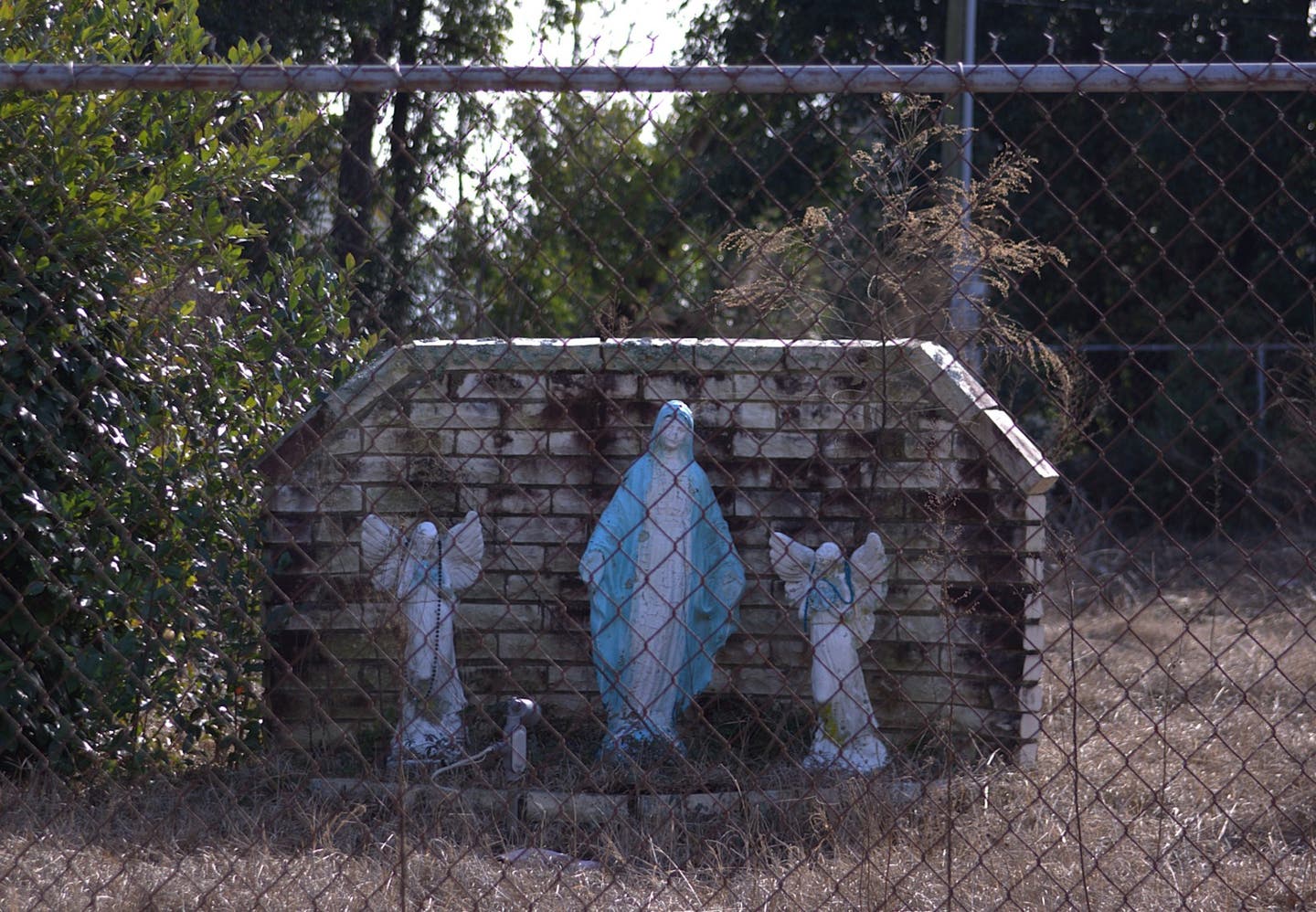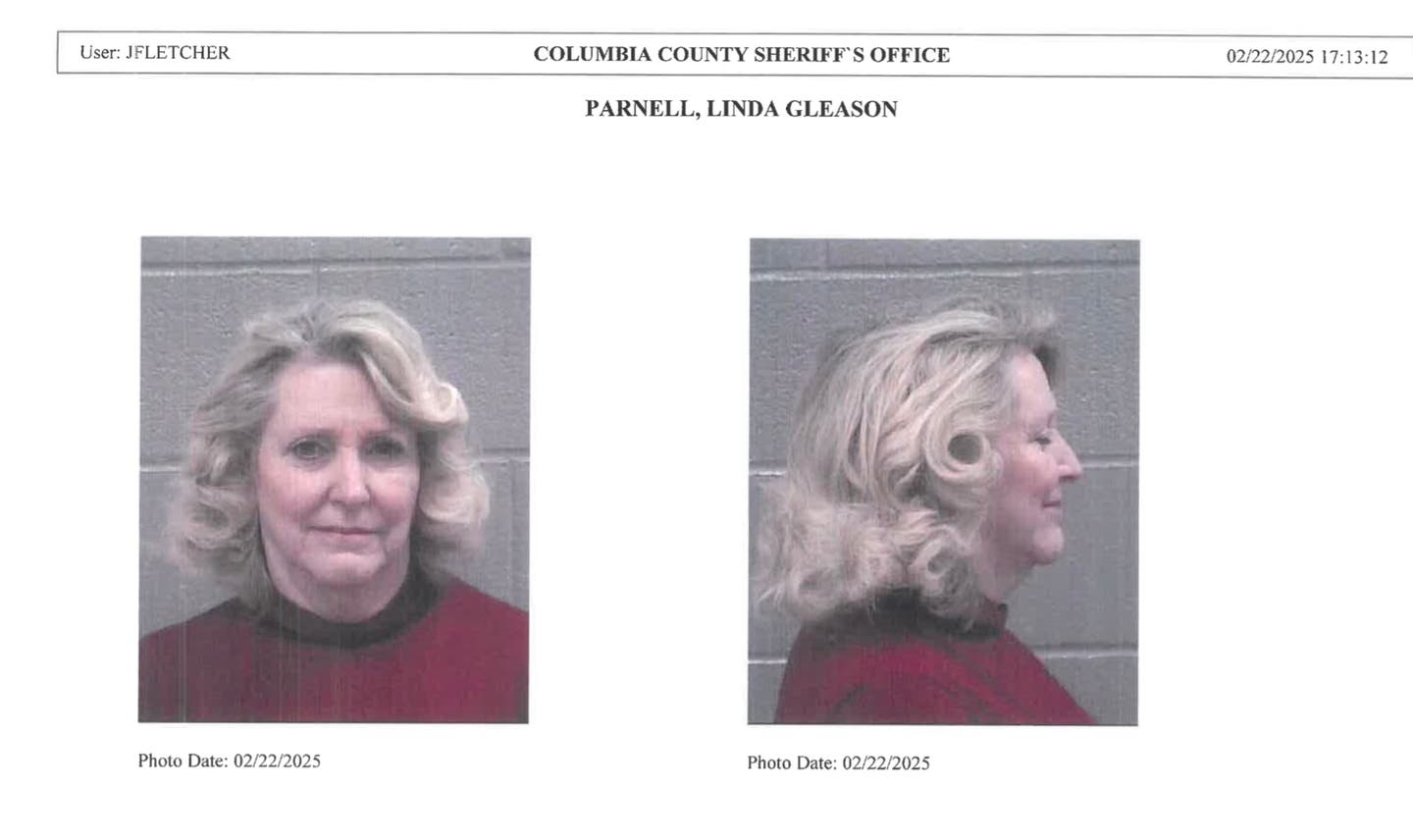Anthropologist’s Research Provides Insight on the Irish Travellers of Murphy Village
Plenty of people told Zara R. Browne, a doctoral candidate in anthropology at the University of Nevada, Reno, that she was wasting her time. She had been casting about for…

Some of the distinctive statuary typical to homes in Murphy Village. Murphy Village is home to a community of Irish Travellers who, for more than 50 years, have called the development near North Augusta, South Carolina home.
Special | Zara BrownPlenty of people told Zara R. Browne, a doctoral candidate in anthropology at the University of Nevada, Reno, that she was wasting her time. She had been casting about for a subject for her Doctoral Thesis – meaningful enough to matter and interesting enough to keep her engaged in her research – for some time.
She had vague ideas: Her travels in France and Ireland had stoked an interest in peripatetic (nomadic) communities, but she was still missing a compelling focus.
Appropriately, she found her answer in the front seat of a car. It was a ride that brought her to South Carolina and Murphy Village. It brought her to the Irish Travellers.
Browne will present a free lecture entitled “The Murphy Village Travellers: A Cultural Gem of the CSRA,” Thursday at Augusta University.
The Irish Travellers and Murphy Village
The Irish Travellers, who have been recognized as a distinct ethnic minority in Ireland, trace their roots back to Irish farmers and craftsmen who, in the 1600s, were chased off their land during Oliver Cromwell’s conquest of Ireland. They are still found in Ireland, the United Kingdom, and the United States. Although often referred to as gypsies, a pejorative umbrella term often applied to both the Travellers and Romani communities, they are a distinct and, in Browne’s eyes, wholly unique subculture.
In South Carolina, the Irish Travellers initially established Murphy Village around the Catholic Parish of Our Lady of Peace - and now the parish of St. Edward the Confessor. It was established in the early 1960s when the parish Pastor, Rev. Fr. Joseph John Murphy, encouraged the Travellers who regularly attended his church to settle on land nearby.
Browne said that the Travellers, like many peripatetic communities, tend to be intensely private, insular, and, after centuries of prejudicial treatment, intensely wary of the outside world. As a result, the Travellers have managed to survive with their unique language, customs, and beliefs intact.
“I was amazed by how genuinely different – and ancient – a lot of the customs are,” said Browne, who began her work, which included immersing herself in the Murphy Village community, in 2021. “I could not believe that, in the United States where they watch the same movies, listen to the same music, and are exposed to the same media, that has not changed at all.”
A question of trust
Browne said her belief that she could connect with the Murphy Village community came from her own oppositional nature. People told her that, as an outsider, she would never be allowed the access required for serious research.
“People were telling me that before I even got here,” she said with a laugh. “Then I got here, and you know what – people continued to tell me the same thing.”
Still, Browne approached the project undeterred. Her initial gambit, inspired by time spent in Ireland, was to find the closest pub to Murphy Village. That led her to North Augusta’s legendary Highlander.
“I went in and announced that I was an anthropologist, and I was interested in meeting the Irish Travellers of North Augusta and if anyone in there was a Traveller and would like to speak to me, I would love that,” she said. “The whole bar exploded into laughter.”
Still, she returned to the bar, listening to people’s Traveller tales and being assured, in no uncertain terms, that she would never talk to them.
On her third night – the evening she was scheduled to leave North Augusta – she was approached by a man who said he liked how she talked about the Travellers – with respect and earnest curiosity.
“He liked that I didn’t call them gypsies,” she said. “He liked that I didn’t talk nasty about them. He liked that I defended them.”
He invited her to meet her at Starbucks the next day and told her they were going on a road trip.
“It was a really horrible idea,” she said. Still, they drove out to Murphy Village where she was told she had five minutes with a Traveller woman, so she better “make it good.”
That initial meeting led to talking to a larger group later that day. From there, her access and engagement with the community ballooned.
“That’s how the Village works,” she said. “If something happens, 300 people know about it in five minutes.”
She said once people understood she was authentically – and academically – interested, doors opened. She said while the Murphy Village residents were cautious at first, they began to understand, over time, that her intentions were pure.
“They saw that if I had been a reporter or an FBI agent or making some kind of HBO documentary, something would have happened,” she said. “So, the more time that went by, the more they shared with me.”
Dispelling the myths
She quickly learned they still speak their own ancient language, and while devoutly Roman Catholic, still take stock in folkloric stories and customs. She said that many of the Traveller customs, beliefs and cultural indicators clearly brand the community as outsiders. She said that she also learned that many of the stories she had heard, stories of organized criminal activity, kings and queens, and abductions, were patently untrue. Was there criminal activity in Murphy Village? Yes, just like any other population its size – an estimated 3,000 Travellers live in the community. Is it true that some of the large homes in the community sit empty for extended periods? Absolutely, Browne said. Right up until the point they are finished building them. The tin foil on the windows, she said, has nothing to do with evil spirits and everything to do with privacy and climate control when the Travellers, who still work on the road, are away from home. She said the most egregious rumor she heard was that the Travellers maintained a hidden community of disabled children born with genetic birth defects – a colony of sick people.
“That is not true at all,” she said. “They do not marry close relatives and the children I have met have all been happy and healthy.”
That does not mean, however, that some Traveller customs are not unusual and, in some circles, controversial. In an earlier study, Browne acknowledged that Traveller marriages were often arranged – sometimes in infancy – and often occur while the couple is still in its teens. She said that Traveller families often pull their children out of formal education early, preferring a practical education at home. She said that while this may feel out-of-step with contemporary American society, it is not that unusual in many cultures – particularly those that limit interaction with the outside world.
Browne said that the stories, both true and false, have helped a near-perfect feedback loop of mistrust develop. Those outside the community – “country people” in the Traveller parlance – amplify the negative stories, she said. In return, the Travellers, with real intention, cut themselves off from the rest of the world, letting their differences rather than their commonalities define them.
“It’s been like that for so long,” Browne said. “But the truth is that these people that are not like us are, in fact, a lot like us. I know people have stories, but that does not mean we can homogenize an entire culture.”
“That’s something that surprised me,” she said. “There are so many Travellers out there trying to do honest work, to be kind to outsiders, and to be more open-minded. They are genuinely frustrated to be lumped in with people who have not done that.”
The nature of change
Initially, Browne said, her goal was to learn about the Travellers. Over the course of her research and, more significantly, her time with the families of Murphy Village, she found her goals shifting and her perspective on what she believed she understood about the world evolving.
“I have changed so much,” she said quietly. “I have grown so much. This has made me question what we consider right and wrong and how much of that is cultural and how much is not. What I’ve really learned is that you can connect and have uncanny commonalities with someone from anywhere. I believe they have made me a kinder – and much more open-minded person.”
While Browne sees her job documenting Murphy Village and the people that call it home as a worthy academic exercise, she admits that it has also been a bit of a melancholy experience. She said she believes the Traveller culture will someday disappear, assimilated into the larger world. It probably, she said, has more days behind it than ahead. Her hope is that people outside Murphy Village can come to understand the Travellers and embrace their unique culture before it disappears.
WHAT: “The Murphy Village Travellers: A Cultural Gem of the CSRA,” presented by Zara Browne
WHEN: 11:30 a.m. Thursday, February 20
WHERE: Reese Library, 2nd Floor, Augusta University
COST: Free. Reception follows.
Suggested Reading: “Irish Travellers: An Undocumented Journey Through History” by Mike J. Carroll
![augustatoday.com logo@4x[324] augusta today logo](/_next/image/?url=https%3A%2F%2Faugustatoday.com%2Fuploads%2F2024%2F08%2Faugustatoday.com-logo%404x324.png%3Fauto%3Dwebp&w=3840&q=75)





